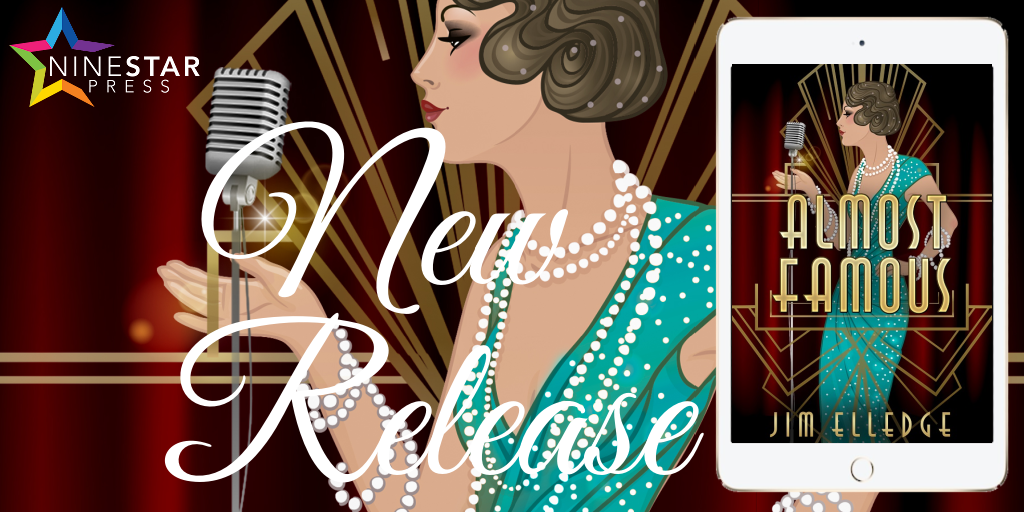Title: Almost Famous
Author: Jim Elledge
Publisher: NineStar Press
Release Date: 04/18/2023
Heat Level: 3 – Some Sex
Pairing: No Romance, Male/Male
Length: 91900
Genre: Historical, historical, crime, ménage, gay, performance arts, blue collar, criminals, cross-dressing, humorous, law enforcement, lawyers, musicians, religion, sex industry
Add to Goodreads

Description
One steamy June night in 1925, a woman shot an insurance exec to death. After ten women were arrested and, ultimately, released, a late-night tip led police to Norma West. Although she didn’t look like the shooter, the exec’s widow swore Norma was the murderer—just as she had sworn all ten of the other women were her husband’s killer. Police charged her with the crime after her jailor noticed her five o’clock shadow. The DA banked on the jury convicting a “third-sexer,” whether guilty or not.
Missing her gig as a local cabaret chanteuse, Norma acted outrageously, flirting and camping it up with the reporters who stampeded her cell hoping for a scoop. One, Paul Sammy, a straight tabloid hack, decided to write her biography full of lies and half truths, hoping its popularity would give him a leg up at his paper. Drop-dead gorgeous Victor Winchester, who was tired of defending prostitutes for mafia-supported pimps, offered to defend her for the free publicity her clowning—and notoriety—provoked. Norma became a cause célèbre among Chicago’s fairies, flappers, and sheiks; her trial a circus trigged by her antics; and her fate as much a product of Sammy’s fantastical biography as Victor Winchester’s legal hocus-pocus.
Almost Famous
Jim Elledge © 2023
All Rights Reserved
The Tribune’s want ads listed three openings Anna qualified for—all in the Loop as a secretary. One in a law office. One in an import/export company. The last in an insurance firm. The southbound Clark Street trolley took its time getting to the Loop, and by the time she got to the first two, the vacancies had already been filled, but the last, as personal secretary to Daniel Reesmer, hadn’t been filled yet. She lucked out.
He was older than her by twenty years at least, but he shot upright when she walked through the door to his office opposite his desk.
She answered his questions—all simple, all professional, all focused on her work experience. She didn’t have any but lied. The glimmer in his eyes told her he wouldn’t doubt a word she said.
The personal probing came next.
“Mrs. Norris, you seem to be what I’ve been looking for as far as your credentials are concerned, but I run a God-fearing, Christian office, and I’ve found what seems to be an…inconsistency…in your record that concerns me.”
“Yes?” She knew what was coming next.
“Why is a married woman seeking employment? Your household duties must be enough to keep you busy at home, as your husband, I’m sure, would prefer.”
“Why, I appreciate your concern, Mr. Reesmer. But you see, I’m a widow.”
“Oh, I’m sorry. But you’re so…young.”
“Yes, well, my husband—” She sniffed. She pulled a lace handkerchief from her pocketbook. “A robber killed my husband in a bank holdup. He stepped in front of a woman cradling her baby in her arms as a deranged Bolshevik pulled the trigger. My Johnny was a hero.”
She hadn’t planned on crying, and she surprised herself as much as confused Reesmer. They weren’t the tears of a widow but of a rejected lover. She knew the truth. He didn’t.
“Well, I—”
He didn’t know where to perch his eyes as she cried herself dry. A bachelor all his life, he saw women from afar, if he noticed them at all, and they seemed frail, mysterious, and more susceptible to the evils of the world to him than men were. He didn’t have a clue about how to protect, much less how to comfort, one.
He took a stab at it anyway. “Isn’t your widow’s pension enough?”
Anna allowed the tears free rein again.
He pulled out his handkerchief and held it out to her. His laundress had bleached it a bright white.
Anna had her own in her hand and ignored his.
Sniffing, dabbing her eyes with hers, Anna composed herself. “It would be,” she lied, “but…” She didn’t want to tell him anything that might send him running for the hills, but if he had responded in a different way to her tears—more comforting, more at ease with emotions—she would have kept quiet. Instead, his discomfort told her to spill the beans and let whatever was supposed to happen, happen.
“It would be,” she repeated, “except I’m going to have my Johnny’s baby.”
Johnny skipped out on her without a word, left her and the baby to their own devices, to become defenseless, social pariahs. Did he think she would be like the other young women in her predicament and go to one of those doctors? There were plenty of them, and they preyed on girls like her, those who made a mistake and would pay for it the rest of their lives if they didn’t take care of it right away.
Afterwards, she would beg her father to take her back, and he would, if she made certain promises, tell certain lies when people asked. She vacationed in Europe, she would say, for the past half year, visiting the Louvre, the Lido, plazas and palazzos, not Towertown, not shacked up with a deviant jazz musician who seduced her and, when times got tough, left her high and dry rather than step up to the plate and accept his responsibility.
The thunderstorm that loomed in her eyes broke again. Sobs flooded Reesmer’s office, her body shaking.
Johnny!
She sopped up her tears, but he still held his handkerchief—stiff and white—out to her. It wasn’t a handkerchief anymore but a flag of surrender.
“I’m sorry. I just don’t know what’s to become of my baby and me now that Johnny’s—” She wadded her handkerchief and stuffed it into her pocketbook and took his.
Relieved that her downpour had run its course, he jerked himself upright and cleared his throat, a motion he often used when he made a decision. The rest of the interview would be all business now, and at last, he was comfortable again.
“I’m going to hire you, Mrs. Norris. You fit the bill as far as the qualifications for the position are concerned. Besides, I can’t leave you to fend for yourself in such a world as ours. Won’t you agree to work in my office?”
She did.
Six weeks later, she agreed to his marriage proposal too. They would live as man and wife and raise her child in his house in Uptown, at 5835 North Winthrop. Seven months after the wedding, she gave birth to Eleanor.
No sooner had Eleanor graduated from high school and entered Northwestern University as a liberal arts major than Anna’s life bored her to tears morning, noon, and night. Daniel Reesmer, insurance adjuster, future alderman or more, bored her. Living in staid Uptown bored her. The monotony twisted her stomach into knots. The world had passed her by and left her in its tracks, and she couldn’t do a damned thing about it.
Purchase
NineStar Press | Books2Read
Amazon
Jim Elledge has received two Lambda Literary Awards, one for his book-length poem A History of My Tattoo, the other for Who’s Yer Daddy? Gay Writers Celebrate Their Mentors and Forerunners, co-edited with David Groff. His most recent books are Bonfire of the Sodomites, poems about the arson of the UpStairs Lounge; a biography, Henry Darger, Throwaway Boy; and The Boys of Fairy Town: Sodomites, Female Impersonators, Third-Sexers, Pansies, Queers, and Sex Morons in Chicago’s First Century, a history. Almost Famous is his debut novel.
One lucky winner will receive a $50.00 NineStar Press Gift Code!






